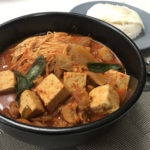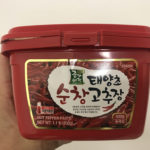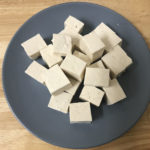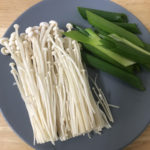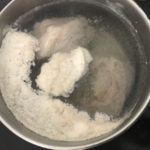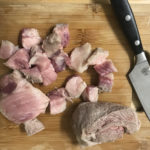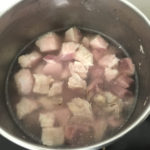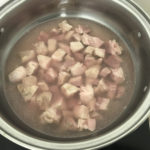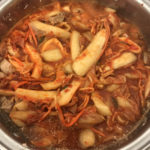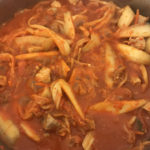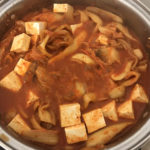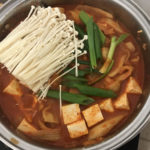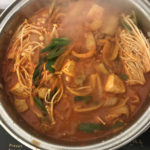Kimchi Jjigae is a common home cooked dish in korean households. It is often made once kimchi has become very fermented and is a delicious way to use up sour kimchi. Kimchi Jjigae is one of my favorite korean comfort foods accompanied by a bowl of rice topped with an over easy fried egg.
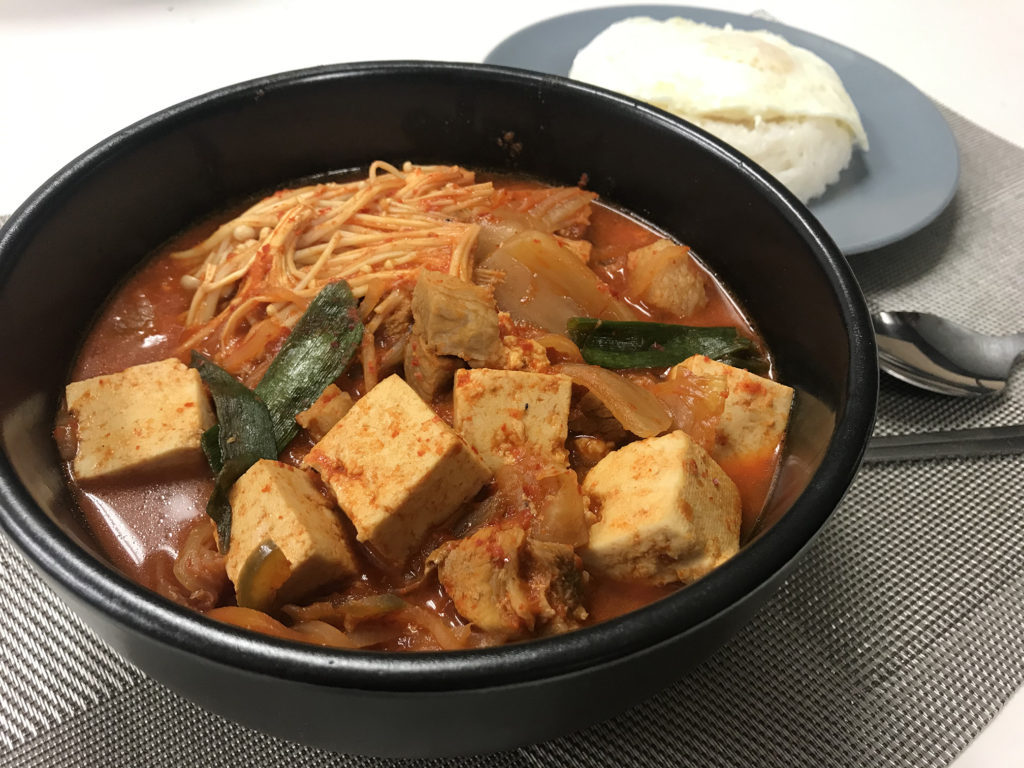
Serves 4
Ingredients
- 3 cups Sohi Kimchi (fermented at least 3 weeks)
- 1 lb pork
- 1/2 lb soft tofu
- 3 – 4 cups water
- 100g enoki mushrooms
- 2 scallions
- 2 tablespoons of gochujjang
- 1 teaspoon of sesame oil
Directions
- Start by cutting the tofu into cubes.
- Rinse the enoki mushrooms and cut off the bottom roots.
- Prepare the pork by removing some of the fat and impurities. Put 3-4 cups of water in a pot. Put the pork into the pot [fresh or frozen] and bring to a boil. As the water boils, you should see brown gunk collecting on the surface of the water. Once the pork has turn to a gray cooked color on the outside and there doesn’t seem to be any additional gunk forming, remove it from the water and cube the pork into bite size pieces. [I find that cutting the pork after it has firmed up from boiling makes it easier to cut].
- Skim the water from the pot removing the gunk from the surface.
- Return the cubed pork to the water and boil for another 3 minutes until there is another layer of gunk.
- Skim the gunk from the surface again.
- Once the gunk is gone [don’t worry if there is a little left, it’s not harmful], drain the water into a bowl leaving the cubed pork in the pot. Measure out 2.5 cups of water from the bowl and return it to the pot.
- Now add 2 tablespoons of gochujjang to the pot and mix until it dissolves.
- Add 3 cups of Sohi kimchi to the pot and bring to a boil. Once boiling reduce to a vigorous simmer [light boil].
- Add 1 teaspoon of sesame oil and mix into the broth. Let simmer for about 10 minutes until kimchi softens.
- Add tofu. Continue to simmer until tofu is hot, approximately 4 minutes.
- Add enoki mushrooms and scallions. Simmer for another 5 minutes.
- Transfer to a serving bowl and enjoy! It goes great with a side of rice and a fried egg. Yum.
Tips, Substitutions, and Variations
- If you have over reduced the soup, you can add some of the remaining water from the boiled pork left in the bowl or plain water is also fine.
- I like to purchase a large pork shoulder and pre-portioned the pork and freeze it for when I want to make some jjigae or bokkeum.
- You can substitute the pork with pretty much any meat. Often we use meaty leftovers in our jjigae like: kalbi, bulgogi, pork chops, or steak.
- Bone-in pork is also wonderful to use in kimchi jjigae. For those who like to tear away meat like a savage.
- You can also add additional veggies in kimchi jjigae as well like onions, spinach, and squash.
- Also a great addition is to add sweet potato noodles. Boil 3 cups sweet potato noodles in a separate pot until cooked and add to kimchi jjigae at the end.

